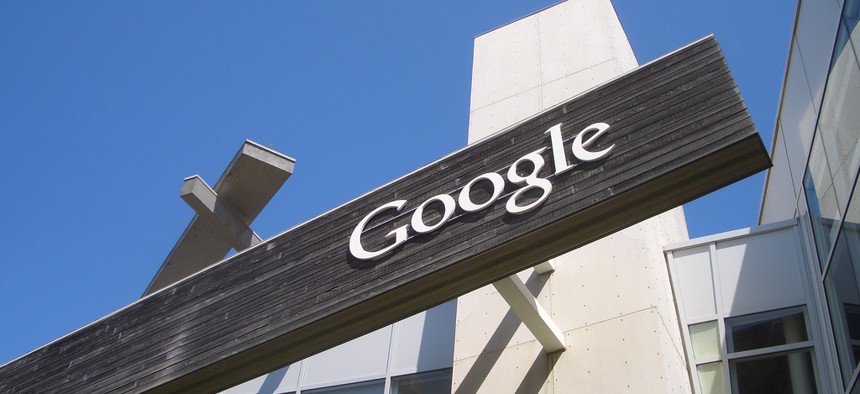Google Fears FCC's New Internet Powers

Flickr user brionv
The Web giant's lobbyists are quietly fretting about a recent court ruling.
A recent court decision that endorsed a broad view of the Federal Communications Commission's authority over the Internet has Google and other Web companies nervous.
In closed-door meetings with regulators and Capitol Hill staff, Google's lawyers have said they're worried how the FCC may use its newfound powers, according to multiple people familiar with the meetings.
The extent of the FCC's authority over Google and other Web services remains unclear, and the current FCC has given no indication that it is interested in pushing aggressive new regulations. But the possibility that the commission could begin telling Google how to organize its search results or handle its users' data is enough to spook the company's army of Washington lobbyists.
The FCC and Google declined to comment.
Last month, the D.C. Circuit Court of Appeals struck down the FCC's net-neutrality rules, which barred Internet service providers from discriminating against or blocking any websites. But the decision was based on the narrow question of whether the rules too closely resembled what are known as "common carriage" regulations.
On the broader issue of the FCC's power to regulate the Internet, the court gave the commission a huge win.
FCC Chairman Tom Wheeler is now trying to use that broad authority to rework the net-neutrality rules. But the decision also opened the door to a host of other possible Internet regulations.
The FCC justified its net neutrality rules by pointing to Section 706 of the Telecommunications Act, which says the agency has the power to promote the deployment of broadband Internet networks.
The court largely deferred to the FCC, saying Congress granted the agency the power to enact regulations that promote the "virtuous cycle" of Internet innovation and network construction.
The Republican-controlled House likely didn't think it was giving the FCC sweeping power over the Internet when it enacted the law in 1996, but the provision could be the hook for a slew of new regulations.
Berin Szoka, president of the libertarian group TechFreedom, warned that the FCC may use its new power to enforce provisions from the controversial Stop Online Piracy Act, better known as SOPA, which Congress abandoned after a massive Web revolt in 2012.
The FCC could, theoretically, order Internet service providers and search engines to block websites offering illegal copies of music and movies. The legal argument would be that online piracy discourages entertainment companies from producing content. Therefore, stamping out piracy would encourage the production of more content, leading to more Internet use, and ultimately the deployment of more broadband networks.
"It could really be anything within the scope of communication," Szoka said. Even if the agency doesn't take formal actions, it could use the threat of its power under Section 706 to pressure companies to comply, Szoka warned.
Harold Feld, the senior vice president of Public Knowledge, usually argues for aggressive FCC action to protect consumers. But even he said the implications of the court's decision are "very troubling."
Feld suggested the FCC could impose privacy protection regulations on Google and other companies under the theory that people would be more likely to use the Internet if they felt their personal information was safe.
The order of Google's search results could also be a target for regulation. Competitors like Microsoft and Yelp have long accused Google of manipulating its search results to favor its own services.
App stores, smart-home devices, instant messaging, and cybersecurity are just a few other possible areas for FCC regulation.
Any new Internet rules under Section 706 would face immediate court challenges, and it's unclear how far the courts would let the FCC go. Other provisions of the Communications Act and constitutional protections such as the First Amendment put some limits on the FCC's power over Internet companies. It's unlikely that the D.C. Circuit ruling will be the final word on the commission's Internet authority.
Google is not the only Web company that's uneasy with the implications of the court's ruling. Facebook, Yahoo, Amazon, and scores of other companies could be affected by new Internet regulations.
But so far, Google has been the most vocal behind the scenes in raising alarm about the scope of the FCC's potential new powers, according to people familiar with the discussions. And the company is advised by an expert on the commission's Internet authority: Austin Schlick was the FCC's general counsel when it enacted the net-neutrality rules, and he is now a Google lawyer.
Robert McDowell, a former Republican FCC commissioner, said Google should have thought through the consequences of supporting net-neutrality rules.
"Those who subscribe to the school of thought that says 'please regulate my rival but not me' almost always live to regret it," McDowell said. "Once you invite the government into your space, it doesn't want to leave anyone in that space alone."
Although Public Knowledge's Feld expressed concern about the FCC's potentially broad power under Section 706, he argued that it's important that the commission have some authority to regulate Internet access. So far, the FCC has declined to apply the regulatory scheme it uses for telephone companies to broadband Internet providers.
"If 706 is the only tool we've got, then we're going to use it," Feld said.
(Image via Flickr user brionv )
NEXT STORY: Government Knocks on BlackBerry Continue






